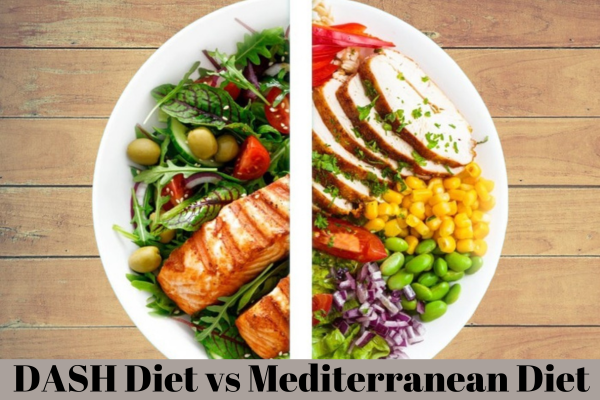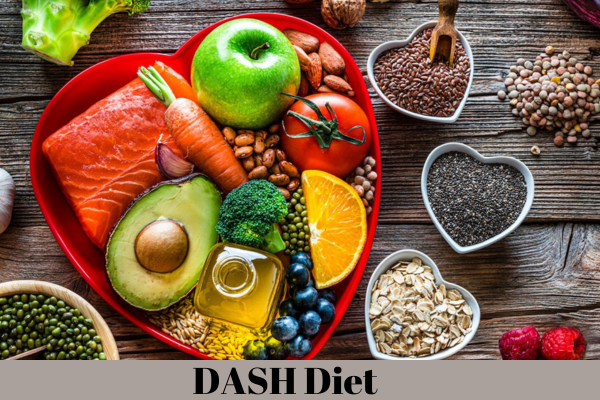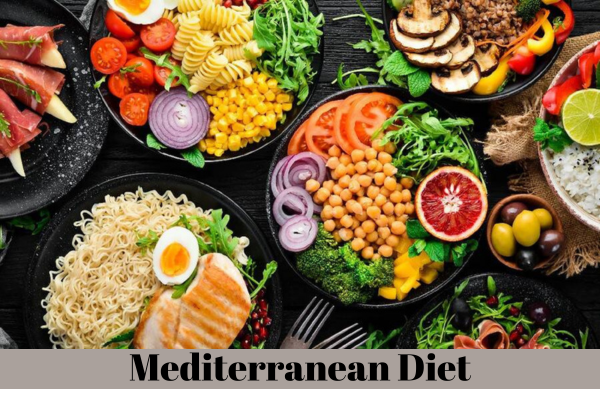DASH Diet vs Mediterranean Diet – Your Choice of 2024

In today’s world of health-conscious living, selecting the right diet can feel like navigating a maze. A comparison of two popular dishes, the DASH Diet vs Mediterranean Diet, stands out for their health benefits and effectiveness in enhancing overall well-being. Let’s delve deeper into each diet and compare them to help you make an informed choice that aligns with your health goals and lifestyle. Let’s dive deep into the comparison of the DASH Diet vs Mediterranean Diet.
Understanding the DASH Diet
What is the DASH Diet?
The DASH Diet, short for Dietary Approaches to Stop Hypertension, is a dietary plan initially created to combat high blood pressure. Its core principles revolve around consuming nutrient-rich foods while limiting sodium intake, aiming to improve heart health and reduce hypertension risk. Pic credit: Cleveland Clinic.

Principles of the DASH Diet
The DASH Diet encourages individuals to focus on:
- Eating Plenty of Fruits and Vegetables: These are rich in essential vitamins, minerals, and fiber, which promote heart health and overall well-being.
- Choosing Whole Grains: Opting for whole grains over refined grains ensures a steady release of energy and provides essential nutrients.
- Opting for Lean Proteins: Incorporating lean protein sources such as poultry, fish, beans, and legumes helps build and repair tissues without the added saturated fats found in red meat.
- Moderating Sodium Intake: Reducing sodium intake helps lower blood pressure levels and minimizes the risk of heart disease and stroke.
- Limiting Sweets and Sugary Beverages: Cutting back on sugary treats and beverages supports weight management and reduces the risk of developing type 2 diabetes.
Foods to Eat and Avoid on the DASH Diet
Foods to Eat:
- Fruits and Vegetables: Berries, leafy greens, citrus fruits, carrots, and bell peppers are excellent choices.
- Whole Grains: Quinoa, brown rice, oats, barley, and whole wheat products are nutritious options.
- Lean Proteins: Chicken breast, turkey, fish, tofu, and legumes like lentils and chickpeas are ideal.
- Low-Fat Dairy: Skim milk, Greek yogurt, and reduced-fat cheese provide calcium and protein without excessive saturated fat.
- Healthy Fats: Incorporating sources like avocados, nuts, seeds, and olive oil adds flavor and essential nutrients to meals.
Foods to Avoid:
- High-Sodium Foods: Processed meats, canned soups, salty snacks, and pre-packaged meals often contain excessive sodium, which can elevate blood pressure.
- Sweets and Sugary Beverages: Limiting consumption of candies, pastries, sugary drinks, and desserts is crucial for weight management and overall health.
- Red Meat: While not entirely forbidden, it’s recommended to limit the intake of red meat and opt for leaner protein sources more frequently.
Insight into the Mediterranean Diet
What is the Mediterranean Diet?
The Mediterranean Diet draws inspiration from the traditional eating habits of countries bordering the Mediterranean Sea, such as Greece, Italy, and Spain. It emphasizes whole, minimally processed foods, with an abundance of plant-based foods, healthy fats, and lean proteins, mirroring the dietary patterns of Mediterranean communities.

Key Components of the Mediterranean Diet
The Mediterranean Diet revolves around:
- Plentiful Plant-Based Foods: Fruits, vegetables, legumes, nuts, seeds, and whole grains form the foundation of this diet, providing essential vitamins, minerals, and antioxidants.
- Healthy Fats: Olive oil is a cornerstone of the Mediterranean Diet, providing monounsaturated fats that support heart health and reduce inflammation. Additionally, nuts, seeds, and fatty fish like salmon and mackerel are rich sources of omega-3 fatty acids.
- Moderate Protein Intake: While plant-based proteins are prominent, moderate consumption of poultry, eggs, and dairy products, particularly yogurt and cheese, is also encouraged.
- Occasional Red Wine: In moderation, red wine is enjoyed with meals in the Mediterranean Diet, providing antioxidants and potentially benefiting heart health.
- Limited Processed Foods: Highly processed snacks, sugary treats, and refined grains are kept to a minimum, with emphasis placed on whole, nutrient-dense foods.
Foods to Eat and Avoid on the Mediterranean Diet
Foods to Eat:
- Fruits and Vegetables: Tomatoes, cucumbers, spinach, grapes, figs, and other seasonal produce feature prominently.
- Whole Grains: Bulgur, farro, couscous, whole grain bread, and pasta offer fiber and sustained energy.
- Healthy Fats: Olive oil, avocados, almonds, walnuts, and fatty fish like salmon and sardines are staples.
- Lean Proteins: Fish and seafood, poultry, eggs, legumes, and occasional servings of lean cuts of red meat provide protein without excess saturated fat.
- Dairy: Greek yogurt, feta cheese, and other low-fat dairy options offer calcium and probiotics for gut health.
Foods to Avoid:
- Processed Foods: Highly processed snacks, sugary beverages, and convenience meals should be limited to occasional treats.
- Red Meat: While not entirely excluded, consumption of red meat is minimized in favor of leaner protein sources.
- Refined Grains: White bread, white rice, and other refined grain products offer less nutritional value compared to their whole grain counterparts and should be consumed sparingly.
DASH Diet vs Mediterranean Diet: Similarities and Differences
Comparison of both the diets -DASH Diet vs Mediterranean Diet share common ground in promoting health and well-being, but they also have distinct characteristics.
Nutrient Composition of DASH Diet vs Mediterranean Diet:
The DASH Diet prioritizes sodium reduction and emphasizes nutrient-rich foods to lower blood pressure, whereas the Mediterranean Diet emphasizes healthy fats and whole foods to support heart health and overall wellness.
Health Benefits: of DASH Diet vs Mediterranean Diet:
Both diets offer numerous health benefits, including improved heart health, better blood sugar control, and potential weight loss. However, the specific mechanisms through which these benefits are achieved may vary.
Weight Loss Potential of DASH Diet vs Mediterranean Diet:
While both diets can facilitate weight loss when combined with a balanced eating plan and regular physical activity, the DASH Diet’s focus on portion control and sodium reduction may make it slightly more effective for rapid weight loss in some individuals.
Which Diet- Dash Diet vs Mediterranean Diet, is Right for You?
Selecting between the Dash Diet and the Mediterranean Diet depends on various factors, including:
- Health Goals: Whether you aim to lower blood pressure, improve heart health, manage weight, or enhance overall well-being.
- Dietary Preferences: Whether you prefer a diet rich in fruits and vegetables with controlled sodium intake (Dash Diet) or one that emphasizes healthy fats and whole foods (Mediterranean Diet).
- Lifestyle Considerations: Whether you can feasibly integrate the dietary guidelines into your daily routine and sustain them long-term.
Consulting with a healthcare professional or registered dietitian (for DASH Diet vs Mediterranean Diet) can provide personalized guidance tailored to your individual needs and preferences.
To read similar articles. Click here.
Frequently Asked Questions:
Between the diets -DASH Diet vs Mediterranean Diet, both the diets can facilitate weight loss when combined with a calorie-controlled eating plan and regular exercise. However, individual results may vary based on factors such as metabolism, activity level, and adherence to the diet.
Yes, you can incorporate aspects of both diets by focusing on whole, nutrient-dense foods, limiting processed foods and unhealthy fats, and prioritizing plant-based meals. Experimenting with recipes and meal plans that combine elements of both diets can offer variety and flexibility.
Between the Diets -DASH Diet vs Mediterranean Diet, both the Diets are generally safe for most individuals, it’s essential to ensure you’re meeting your nutritional needs and not overly restricting certain food groups. Consulting with a healthcare professional or registered dietitian can help address any concerns and ensure a balanced approach to nutrition
Between DASH Diet vs Mediterranean Diet, both the Diets have been shown to improve heart health by reducing risk factors such as high blood pressure, cholesterol levels, and inflammation. The choice between the two depends on individual preferences and dietary requirements.
Yes, between DASH Diet vs Mediterranean Diet, both the Diets are sustainable long-term dietary approaches that promote overall health and well-being. With proper planning and flexibility, you can adapt these diets to suit your tastes and preferences while reaping their health benefits for years to come.
